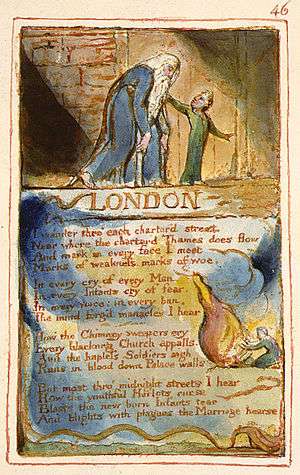London (William Blake poem)

London is a poem by William Blake, published in Songs of Experience in 1794. It is one of the few poems in Songs of Experience that does not have a corresponding poem in Songs of Innocence. Blake lived in the capital city of London, which was the location for this poem. The poems reference the "Two Contrary States of the Human Soul". The "Songs of Innocence" section contains poems which reference love, childhood and nature. Critics have suggested that the poems illustrate the effects of modernity on people and nature, through the discussion of dangerous industrial conditions, child labour, prostitution and poverty.[2]
Poem
I wander thro' each charter'd street,
Near where the charter'd Thames does flow,
And mark in every face I meet,
Marks of weakness, marks of woe.
In every cry of every Man,
In every Infant’s cry of fear,
In every voice, in every ban,
The mind-forg'd manacles I hear.
How the Chimney-sweeper’s cry
Every black'ning Church appalls;
And the hapless Soldier’s sigh
Runs in blood down Palace walls.
But most, thro' midnight streets I hear
How the youthful Harlot’s curse
Blasts the new born Infant’s tear,
And blights with plagues the Marriage hearse.
Publishing
Songs of Innocence and Experience was originally hand-printed and illustrated by Blake in 1794.[2]
Allusions
Blake suggests that the experience of living there could encourage a revolution on the streets of the capital. This could have been influenced by the recent French revolution. The use of the word "chartered" is ambiguous and goes against control and ownership. It may express the political and economic control that Blake considered London to be enduring at the time of his writing. Blake's friend Thomas Paine had criticised the granting of Royal Charters to control trade as a form of class oppression.[3] However, "chartered" could also mean "freighted" and may refer to the busy or overburdened streets and river or to the licensed trade carried on within them.[4] In the original draft, the word used was simply "dirty" ("I wander through each dirty street / Near where the dirty Thames does flow").Blake makes reference to the "Blackening church" suggesting that the church as an institution is not only physically blackening from the factories of Victorian era London, but is actually rotting from the inside, insinuating severe corruption. [5]
Adaptations
Ralph Vaughan Williams set the poem to music in his 1958 song cycle Ten Blake Songs.
The poem was set to music in 1965 by Benjamin Britten as part of his song cycle Songs and Proverbs of William Blake.
References
- ↑ Morris Eaves, Robert N. Essick, and Joseph Viscomi (eds.). "Songs of Innocence and of Experience, object 46 (Bentley 46, Erdman 46, Keynes 46) "LONDON"". William Blake Archive. Retrieved June 10, 2014.
- 1 2 "BBC - GCSE Bitesize: Context". Retrieved 2018-08-24.
- ↑ Stephen Bygrave (ed), Romantic Writings, Routledge, 1996, p. 20; The Invisible Worm, Tom Paulin, The Guardian, March 3, 2007.
- ↑ E. P. Thompson, Witness Against the Beast: William Blake and the Moral Law, Cambridge University Press, 1993, p. 176.
- ↑ http://www.bl.uk/learning/timeline/item126746.html
External links
| Wikisource has original text related to this article: |
- A Comparison of the original hand-painted copies of "London" available from the William Blake Archive
- William Blake's London by Lethargica. The Internet Archive. Retrieved 07/05/2008.